Unit 2 Last weekend 单元复习(三)-语法+典型例题(共70张PPT)
文档属性
| 名称 | Unit 2 Last weekend 单元复习(三)-语法+典型例题(共70张PPT) |

|
|
| 格式 | pptx | ||
| 文件大小 | 41.6MB | ||
| 资源类型 | 试卷 | ||
| 版本资源 | 人教版(PEP) | ||
| 科目 | 英语 | ||
| 更新时间 | 2025-03-11 00:00:00 | ||
图片预览

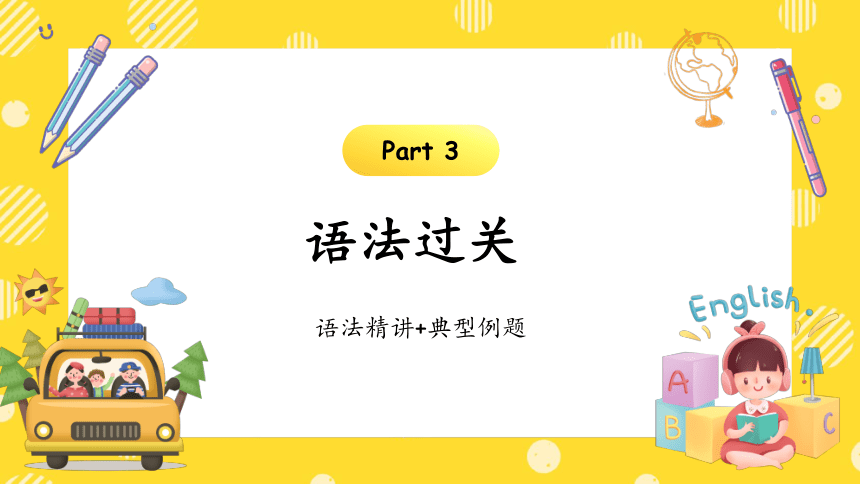
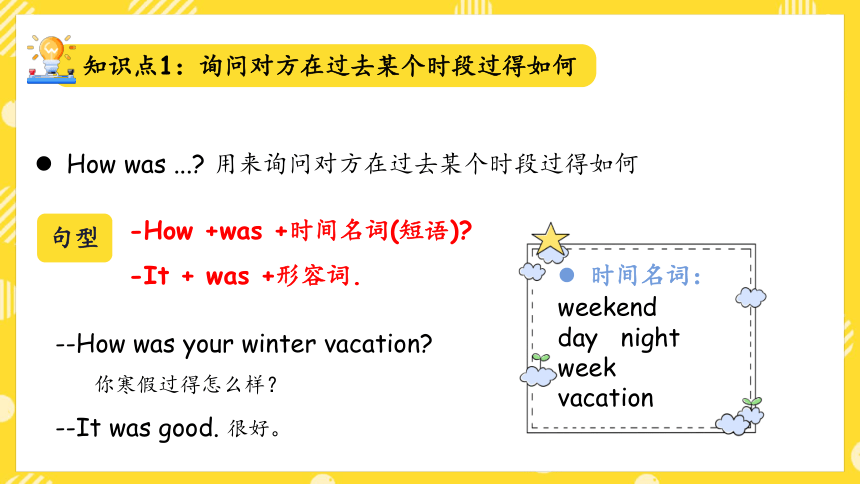
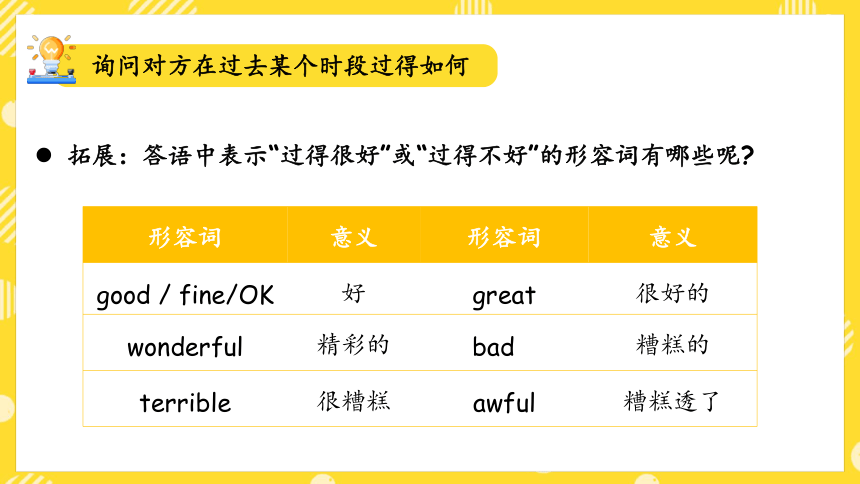

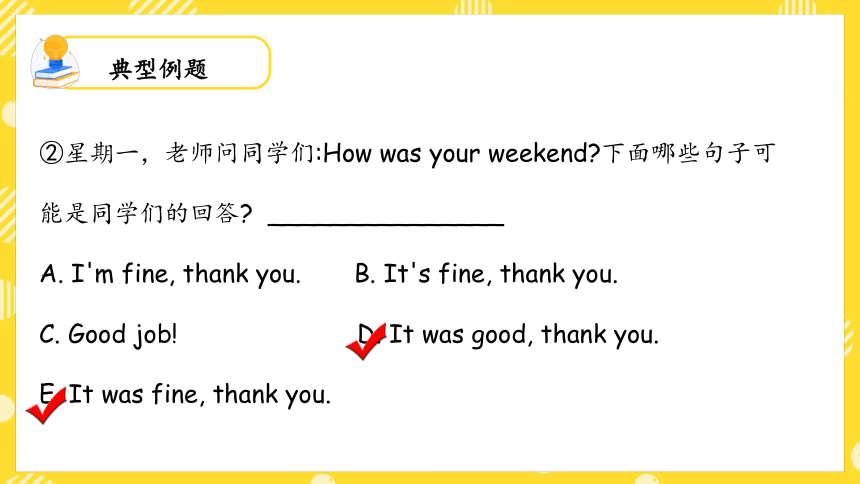
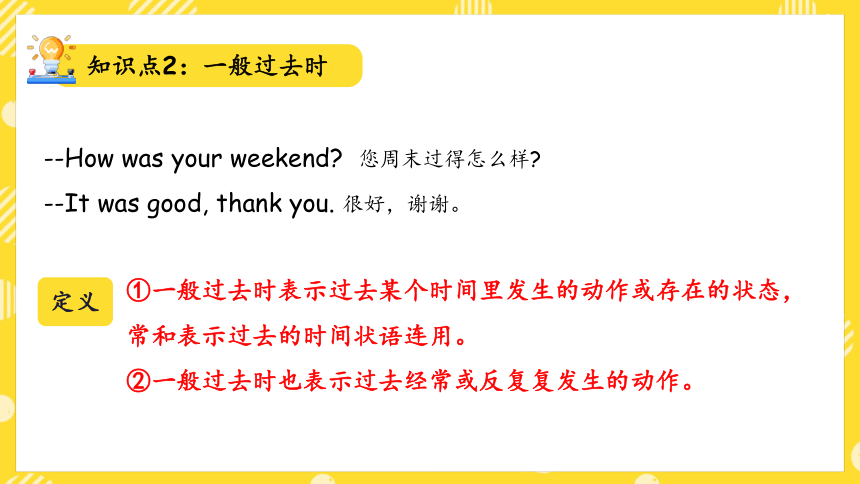
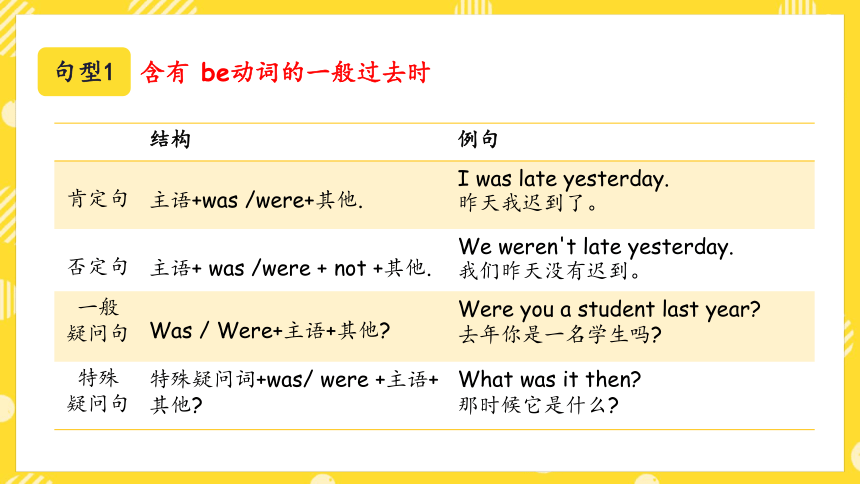
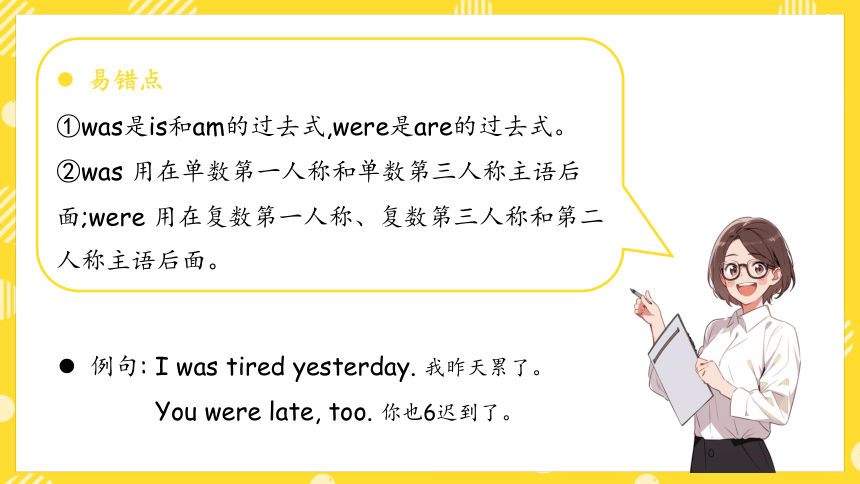
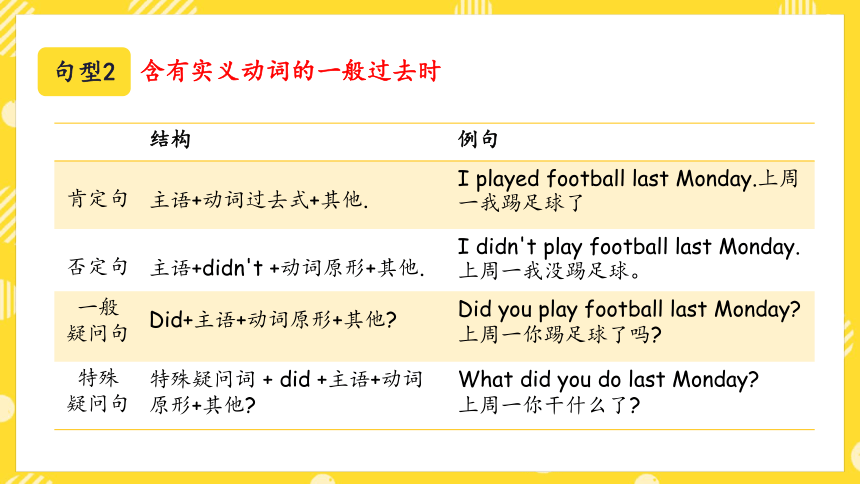
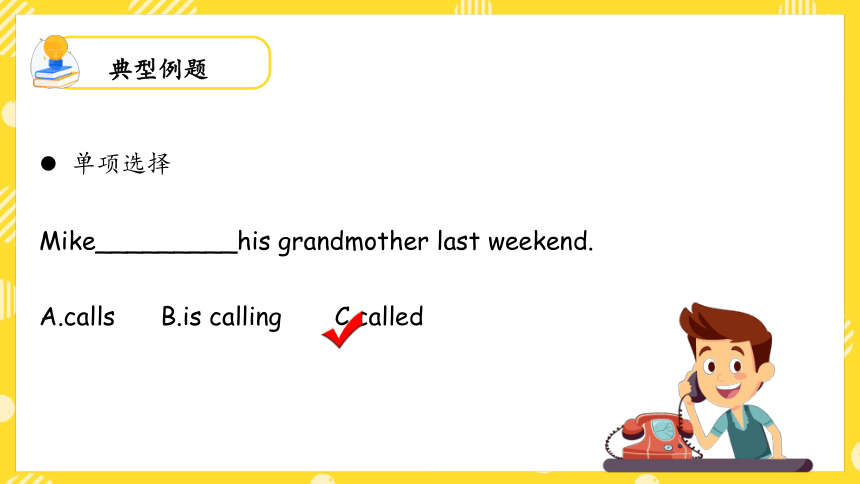
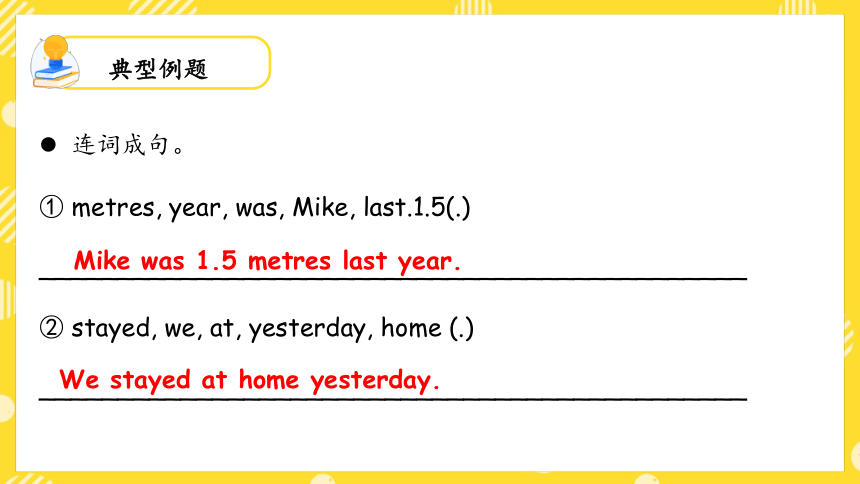
文档简介
(共70张PPT)
Last Weekend
—人教六下复习课件—
主讲教师:Cici
时间:2024.03.19
Unit 2
语法过关
语法精讲+典型例题
Part 3
知识点1:询问对方在过去某个时段过得如何
句型
-How +was +时间名词(短语)
-It + was +形容词.
How was ... 用来询问对方在过去某个时段过得如何
--How was your winter vacation
你寒假过得怎么样?
--It was good. 很好。
时间名词:
weekend
day night
week
vacation
询问对方在过去某个时段过得如何
拓展:答语中表示“过得很好”或“过得不好”的形容词有哪些呢
形容词 意义 形容词 意义
good / fine/OK 好 great 很好的
wonderful 精彩的 bad 糟糕的
terrible 很糟糕 awful 糟糕透了
典型例题
情景交际。
①妈妈星期一就出差了,星期五下午才回来。一进门妈妈就想问小明
过得怎么样,妈妈说:_______________
A. How was your weekend B. How was your week
C. Where are you going
典型例题
②星期一,老师问同学们:How was your weekend 下面哪些句子可能是同学们的回答 _______________
A. I'm fine, thank you. B. It's fine, thank you.
C. Good job! D. It was good, thank you.
E. It was fine, thank you.
知识点2:一般过去时
定义
①一般过去时表示过去某个时间里发生的动作或存在的状态,常和表示过去的时间状语连用。
②一般过去时也表示过去经常或反复复发生的动作。
--How was your weekend 您周末过得怎么样
--It was good, thank you. 很好,谢谢。
句型1
含有 be动词的一般过去时
结构 例句
肯定句 主语+was /were+其他. I was late yesterday.
昨天我迟到了。
否定句 主语+ was /were + not +其他. We weren't late yesterday.
我们昨天没有迟到。
一般 疑问句 Was / Were+主语+其他 Were you a student last year
去年你是一名学生吗
特殊 疑问句 特殊疑问词+was/ were +主语+其他 What was it then
那时候它是什么
易错点
①was是is和am的过去式,were是are的过去式。
②was 用在单数第一人称和单数第三人称主语后面;were 用在复数第一人称、复数第三人称和第二人称主语后面。
例句: I was tired yesterday. 我昨天累了。
You were late, too. 你也6迟到了。
句型2
含有实义动词的一般过去时
结构 例句
肯定句 主语+动词过去式+其他. I played football last Monday.上周一我踢足球了
否定句 主语+didn't +动词原形+其他. I didn't play football last Monday.上周一我没踢足球。
一般 疑问句 Did+主语+动词原形+其他 Did you play football last Monday 上周一你踢足球了吗
特殊 疑问句 特殊疑问词 + did +主语+动词原形+其他 What did you do last Monday
上周一你干什么了
典型例题
单项选择
Mike_________his grandmother last weekend.
A.calls B.is calling C.called
典型例题
连词成句。
① metres, year, was, Mike, last.1.5(.)
_____________________________________________
② stayed, we, at, yesterday, home (.)
_____________________________________________
Mike was 1.5 metres last year.
We stayed at home yesterday.
知识点3:询问某人在过去的时间里做了什么事情
句型
-What + did +主语+do(+过去时间)
-主语+动词(短语)过去式(+其他).
What did ... do ( ... ) 用来询问某人在过去的时间里做了什么事情
--What did you do last weekend
上周末你干什么了
--I played basketball.
我打篮球了。
过去的时间:
yesterday
last night
last weekend two days ago
典型例题
选择正确的选项,补全对话。
①--_________________
--I played sports.
A. How was your weekend B. What do you do
C. What did you do
典型例题
选择正确的选项,补全对话。
②--What did they do
--_________________
A. We flew kites.
B. They flew kites.
C. They are happy.
知识点3:询问某人在过去的时间里做了什么事情
温故知新
What do/does ... do 用来询问某人做什么
例句:
What do you do on the weekend 你周末做什么
I often go shopping. 我经常购物。
(五年级下册Unit 1)
知识点4:规则动词的过去式
构成规则 例词
一般情况下,动词词尾加-ed。 work →worked play→played
以不发音的-e 结尾的动词,动词词尾加 -d。 live →lived move →moved
以辅音字母 +y结尾的动词,把-y改为-i再加-ed。 study →studied try→tried
以一个辅音字母结尾的重读闭音节动词,双写词尾辅音字母,再加-ed。 stop→ stopped
plan →planned
典型例题
用所给动词的正确形式填空。
①We______(live) in the USA last year.
②Mike__________ (study) Chinese last Sunday.
③ Tony______(stay) at home and________ (listen) to mus
yesterday.
lived
studied
stayed
listened
知识点5:不规则动词的过去式
把动词原形中的i改为a
begin→ began drink → drank
give →gave sing→ sang
sit → sat swim→swam
知识点5:不规则动词的过去式
把重读开音节中的i改为o
drive → drove
ride → rode
write →wrote
把动词原形中的aw/ow改为ew
draw → drew
grow→grew
know → knew
throw → threw
知识点5:不规则动词的过去式
把动词原形中的e改为o
get→got forget → forgot
把动词原形中的ee 改为 e
feed→ fed
meet → met
知识点5:不规则动词的过去式
把动词原形中的 eep 改为 ept
keep → kept
sleep→a slept
sweep → swept
把动词原形中的 eak 改为 oke
break → broke
speak → spoke
知识点5:不规则动词的过去式
把动词原形中的 ell 改为 old:
sell → sold tell→told
把动词原形中的an改为 oo:
stand→ stood
understand→ understood
知识点5:不规则动词的过去式
过去式与动词原形一样
let →let
put →put
read →read/red/
知识点5:不规则动词的过去式
构成规则 例词
把动词原形中的i改为a begin→ began drink → drank
把重读开音节中的i改为o drive → drove ride → rode
把动词原形中的aw/ow改为ew draw → drew grow→grew
把动词原形中的e改为o get→got forget → forgot
构成规则 例词
把动词原形中的ee 改为 e feed→ fed meet → met
把动词原形中的 eep 改为 ept keep → kept sleep→ slept
把动词原形中的 eak 改为 oke break → broke speak → spoke
把动词原形中的 ell 改为 old sell → sold tell→told
把动词原形中的an改为 oo stand→ stood
过去式与动词原形一样 let →let put →put
典型例题
用所给动词的正确形式填空。
①I _______ (meet) Miss White last year.
②My parents and I_________(drive) a car to visit my grandpa last night.
③ Last Sunday,Anna__________(read) a book about robots.
met
drove
read
典型例题
单项选择。
①He _____ me a new bag last weekend.
A.give B.gives C.gave
② We _____ a picture together last year.
A. drawing B.draw C.drew
知识点6:一词多义的show
show
n.演出
n.展览,展览会
v.展示,给...看
Let’s go to watch a show.
我们去看演出吧!
There is a car show this afternoon.今天下午有一个汽车展览会。
Show me your pen.给我看看你的钢笔。
知识点7:询问某人在过去的时间里是否做了某事
--Did you do anything else 你还做了其他什么事吗
--Yes, I cleaned my room and washed my clothes.
是的,我打扫了房间,还洗了衣服。
句型
-Did+主语+动词(短语)原形+其他
-肯定回答:Yes,主语+ did.
-否定回答:No,主语+ didn't.
知识点7:询问某人在过去的时间里是否做了某事
易错点
在含有实义动词的一般过去时的一般疑问句中,无论主语是第几人称,是单数还是复数,助动词都用 did,实义动词要用原形。
知识点7:询问某人在过去的时间里是否做了某事
Did he go to the zoo yesterday
昨天他去动物园了吗
Yes, he did.
是的,他去了。
No, he didn't.
不,他没去。
温故知新:含有实义动词的一般现在时的一般疑问句:
句型
--Do/Does+主语+动词原形+其他
--肯定回答:Yes,主语+do/does.
--否定回答: No,主语+ don't / doesn't.
例句:--Do you often read books in this park 你经常在这个公园里看书吗
--No, I don't. 不,我不经常在这里看书。
知识点8:含有实义动词的一般过去时的陈述句改为一般疑问句
在陈述句的句首添加助动词did。
把后面的动词的过去式改为原形。
把陈述句的句号改为问号。
陈述句中主语的第一人称改为第二人称。
知识点8:含有实义动词的一般过去时的陈述句改为一般疑问句
例句:
陈述句:I finished the work last night. 昨晚我完成了工作。
一般疑问句:Did you finish the work last night 你昨晚完成工作了吗
肯定回答:Yes,I did. 是的,我完成了。
否定回答:No,I didn’t. 不,我没完成。
典型例题
根据图片将对话补充完整。
①--Did you clean your room, Susan
--No, I didn't. I ________ ________ ________.
washed my clothes
典型例题
根据图片将对话补充完整。
②--________ ________ ________breakfast this morning
--Yes, I did.
Did you eat
知识点9:want to ... 表示想要做某事
句型
主语 + want(s) to + 动词原形(+其他).
例句: I want to buy the new film magazine.
我想买期新的电影杂志。
He wants to go for a walk.
他想去散步。
易错点:
当主语为第三人称单数时,
want 改 wants.
知识点9:want to ... 表示想要做某事
want 作动词,意为“想要”,它还有两种常见用法:
句型 意义 例句
主语+want(s)+名词. 表示某人想要某物 I want a new shirt.
我想要件新衬衣
主语+want(s)+某人+to+动词原形+其他. 表示某人想让别人做某事 He wants his parents to go on a trip. 他想让父母去旅行。
知识点9:want to ... 表示想要做某事
温故知新
would like 也可表示“想要”,would like 语气比 want 委婉。
句型
主语+would like +想要的东西.
例句: I'd like some water.( I'd like =I would like )
我想喝些水。
知识点10:询问某人/物在过去是不是处于某种状态
--Was it interesting 它有趣吗
--Yes, it talked about a lot of new films.
Was / Were sb. / sth. ... 用来询问某人/物在过去是不是处于某种状态
这是含有 be 动词的一般过去时的一般疑问句。
知识点10:询问某人/物在过去是不是处于某种状态
句型
Be 动词的过去式+主语+其他
答语类型 句型
肯定回答 Yes, 主语+ was / were.
否定回答 No,主语+ wasn't / weren't.
知识点10:询问某人/物在过去是不是处于某种状态
例句:
--Were you busy last weekend
你们上周末忙吗
--No, we weren't. 不,我们不忙。
典型例题
单项选择。
①________ it cold yesterday
A. Is B.Was C.Were
②________ they happy last weekend
A.Was B.Were C.Are
知识点11:含有be动词的一般过去时的陈述句改为一般疑问句
把陈述句的be动词调到句首。
把陈述句的句号改为问号。
第一人称改为第二人称,
句首的be动词也要相应变化。
例句:
陈述句: I was ill last Monday.上周一我生病了。
一般疑问句:Were you ill last Monday 上周一你生病了吗
肯定回答: Yes,I was. 是的,我生病了。
否定回答:No,I wasn’t. 不,我没有。
知识点11:含有be动词的一般过去时的陈述句改为一般疑问句
温故知新
Is / Are ... 用于询问某人或某物是否在现在或经常性,习惯性地处于某种状态。
例句:--Are they on the table 它们在桌子上吗
--No, they aren't. 不,它们不在。
(四年级上册Unit 4 )
知识点11:含有be动词的一般过去时的陈述句改为一般疑问句
-Did you see a film 你看电影了吗
-No, I had a cold. I stayed at home all weekend and slept.
没有,我感冒了。整个周末都待在家里睡觉。
知识点12:have的用法
have ... 可以用来表示“得了……疾病’
结构
have + a / an +疾病名称
have用法总结:
含义 例句
有 I have a ruler.我有一把尺子。
吃,喝 Have some bread. 吃些面包吧。
Can I have some water, please 请给我一些水好吗
上课 When do you have maths classes
你们什么时候上数学课
举行,组织 We'll have an English party next Tuesday.
下周二我们将要举行一个英语联欢会。
经历 Have a good time! 玩得开心!
患病 My mother had a toothache last night.
我妈妈昨天晚上牙疼。
典型例题
用 have 的适当形式填空。
①________ some juice, please.
②Lynn ________ a headache yesterday.
③Do you ________ a basketball
Have
had
have
知识点13:一词多义的cold
cold
n.感冒,伤风
adj.寒冷的
He had a cold again yesterday.
昨天他又感冒了。
He feels cold.
他感觉冷。
典型例题
单项选择。
It was ______ yesterday. I didn't wear my coat. I _________.
A. warm; had a cold
B. cold; had a cold C. cold; have a cold
知识点14:sorry的用法小结
含义 用法 例句
遗憾,难过 对他人的不幸或痛苦表示同情或遗憾。 I'm sorry to hear that.
听到那个消息我很难过。
抱歉 用来表示委婉的拒绝。 --Can you give me that book
你能给我那本书吗
--Sorry, I can't. 抱歉,我不能。
对不起 自己做错事,用来表示道歉。 I'm sorry. I hurt you.
对不起。我弄伤了你。
典型例题
单项选择。
--I was sad yesterday. My cat was ill.
--Oh, ________. Is it better now
A. excuse me B. I'm sorry C.Sorry
知识点15:含有 be 动词的一般过去时的否定句
表示在过去的某个时间里,主语没有处于某种状态。
句型
主语 + wasn't / weren't +其他.
例句: My sister wasn't happy last night.
我的妹妹昨天晚上不高兴了。
易错点:
wasn't=was not,weren't
=were not
知识点16:含有be 动词的一般过去时的肯定句改为否定句
用法
可直接在was 或were后加 not构成否定句。
例句:
肯定句: I was short last year. 我去年个子矮。
否定句: I was not / wasn't short last year. 我去年个子不矮。
知识点16:含有be 动词的一般过去时的肯定句改为否定句
用法
主语+am /is / are + not + 其他.
温故知新:含有be动词的一般现在时的否定句:
例句: He isn't a student. 他不是一名学生。
典型例题
单项选择。
The boy ____ in the zoo yesterday. He stayed at home all day.
A.was B. were C. wasn't
典型例题
把下列句子改为否定句。
①It was interesting.
________________________________________
②They were young at that time.
________________________________________
It wasn’t/was not interesting.
They weren’t/ were not young at that time.
知识点17:work 的用法小结
用法 例句
动词,意为“(机器、装置等)运转;运行” My watch didn't work.
我的手表坏了。
动词,意为“工作;从事……工作”。 My mother works in a hospital.
我妈妈在医院工作。
名词,意为“工作”,是不可数名词。 He has too much work to do.
他有太多工作要做。
典型例题
给下列问句选择恰当的答句。
①--Where does your sister work
--____________________________
A. It doesn't work. B. Because she has much work to do.
C. She works in a factory.
典型例题
给下列问句选择恰当的答句。
② --Why does your mother go to work on the weekend
--____________________________
A. It doesn't work. B. Because she has much work to do.
C. She works in a factory.
典型例题
给下列问句选择恰当的答句。
③--What's the matter with your mother's fridge
--____________________________
A. It doesn't work. B. Because she has much work to do.
C. She works in a factory.
知识点18:不一样的 “听”
词汇 用法 例句
listen 多用于祈使句,表示让别人仔细听。但listen是个不及物动词,它后面不能直接接宾语。 Listen! They are singing.
听!他们正在唱歌。
listen to 后面可以接宾语,表示集中注意力仔细听,但不一定听到什么,强调的是听的动作。 She is listening to music.
她正在听音乐。
The students listen to the teacher carefully.
学生们认真地听老师讲课。
hear 多表示无意识地听见,强调听见了,指声音传进了耳朵,强调听的结果。 Can you hear me
你能听见我说话吗
典型例题
选择正确的选项补全句子。
①Louder, please. I can't _________ you.
② I ______ but heard nothing.
③I often _____ music on TV.
A.listen B.listened C. hear
D.heard E.listen to
C
B
E
知识点19:含有实义动词的一般过去时的否定句
表示主语在过去的时间里,没有进行某个动作。
句型
主语+ didn't +动词原形+其他.
例句:He didn't go boating yesterday.
昨天他没去划船。
知识点19:含有实义动词的一般过去时的否定句
易错点
句中如果出现didn't或did not后面的实义动词要用原形。
知识点20:含有实义动词的一般过去时的陈述句变否定句
在主语后面、实义动词前面添加didn't。
把肯定句中的动词的过去式改为原形。
知识点20:含有实义动词的一般过去时的陈述句变否定句
例句:
肯定句:My father climbed the mountain last week.
我爸爸上周爬山了。
否定句:My father didn't climb the mountain last week.
我爸爸上周没有爬山。
See You!
—人教六下复习课件—
主讲教师:Cici
时间:2024.03.19
Last Weekend
—人教六下复习课件—
主讲教师:Cici
时间:2024.03.19
Unit 2
语法过关
语法精讲+典型例题
Part 3
知识点1:询问对方在过去某个时段过得如何
句型
-How +was +时间名词(短语)
-It + was +形容词.
How was ... 用来询问对方在过去某个时段过得如何
--How was your winter vacation
你寒假过得怎么样?
--It was good. 很好。
时间名词:
weekend
day night
week
vacation
询问对方在过去某个时段过得如何
拓展:答语中表示“过得很好”或“过得不好”的形容词有哪些呢
形容词 意义 形容词 意义
good / fine/OK 好 great 很好的
wonderful 精彩的 bad 糟糕的
terrible 很糟糕 awful 糟糕透了
典型例题
情景交际。
①妈妈星期一就出差了,星期五下午才回来。一进门妈妈就想问小明
过得怎么样,妈妈说:_______________
A. How was your weekend B. How was your week
C. Where are you going
典型例题
②星期一,老师问同学们:How was your weekend 下面哪些句子可能是同学们的回答 _______________
A. I'm fine, thank you. B. It's fine, thank you.
C. Good job! D. It was good, thank you.
E. It was fine, thank you.
知识点2:一般过去时
定义
①一般过去时表示过去某个时间里发生的动作或存在的状态,常和表示过去的时间状语连用。
②一般过去时也表示过去经常或反复复发生的动作。
--How was your weekend 您周末过得怎么样
--It was good, thank you. 很好,谢谢。
句型1
含有 be动词的一般过去时
结构 例句
肯定句 主语+was /were+其他. I was late yesterday.
昨天我迟到了。
否定句 主语+ was /were + not +其他. We weren't late yesterday.
我们昨天没有迟到。
一般 疑问句 Was / Were+主语+其他 Were you a student last year
去年你是一名学生吗
特殊 疑问句 特殊疑问词+was/ were +主语+其他 What was it then
那时候它是什么
易错点
①was是is和am的过去式,were是are的过去式。
②was 用在单数第一人称和单数第三人称主语后面;were 用在复数第一人称、复数第三人称和第二人称主语后面。
例句: I was tired yesterday. 我昨天累了。
You were late, too. 你也6迟到了。
句型2
含有实义动词的一般过去时
结构 例句
肯定句 主语+动词过去式+其他. I played football last Monday.上周一我踢足球了
否定句 主语+didn't +动词原形+其他. I didn't play football last Monday.上周一我没踢足球。
一般 疑问句 Did+主语+动词原形+其他 Did you play football last Monday 上周一你踢足球了吗
特殊 疑问句 特殊疑问词 + did +主语+动词原形+其他 What did you do last Monday
上周一你干什么了
典型例题
单项选择
Mike_________his grandmother last weekend.
A.calls B.is calling C.called
典型例题
连词成句。
① metres, year, was, Mike, last.1.5(.)
_____________________________________________
② stayed, we, at, yesterday, home (.)
_____________________________________________
Mike was 1.5 metres last year.
We stayed at home yesterday.
知识点3:询问某人在过去的时间里做了什么事情
句型
-What + did +主语+do(+过去时间)
-主语+动词(短语)过去式(+其他).
What did ... do ( ... ) 用来询问某人在过去的时间里做了什么事情
--What did you do last weekend
上周末你干什么了
--I played basketball.
我打篮球了。
过去的时间:
yesterday
last night
last weekend two days ago
典型例题
选择正确的选项,补全对话。
①--_________________
--I played sports.
A. How was your weekend B. What do you do
C. What did you do
典型例题
选择正确的选项,补全对话。
②--What did they do
--_________________
A. We flew kites.
B. They flew kites.
C. They are happy.
知识点3:询问某人在过去的时间里做了什么事情
温故知新
What do/does ... do 用来询问某人做什么
例句:
What do you do on the weekend 你周末做什么
I often go shopping. 我经常购物。
(五年级下册Unit 1)
知识点4:规则动词的过去式
构成规则 例词
一般情况下,动词词尾加-ed。 work →worked play→played
以不发音的-e 结尾的动词,动词词尾加 -d。 live →lived move →moved
以辅音字母 +y结尾的动词,把-y改为-i再加-ed。 study →studied try→tried
以一个辅音字母结尾的重读闭音节动词,双写词尾辅音字母,再加-ed。 stop→ stopped
plan →planned
典型例题
用所给动词的正确形式填空。
①We______(live) in the USA last year.
②Mike__________ (study) Chinese last Sunday.
③ Tony______(stay) at home and________ (listen) to mus
yesterday.
lived
studied
stayed
listened
知识点5:不规则动词的过去式
把动词原形中的i改为a
begin→ began drink → drank
give →gave sing→ sang
sit → sat swim→swam
知识点5:不规则动词的过去式
把重读开音节中的i改为o
drive → drove
ride → rode
write →wrote
把动词原形中的aw/ow改为ew
draw → drew
grow→grew
know → knew
throw → threw
知识点5:不规则动词的过去式
把动词原形中的e改为o
get→got forget → forgot
把动词原形中的ee 改为 e
feed→ fed
meet → met
知识点5:不规则动词的过去式
把动词原形中的 eep 改为 ept
keep → kept
sleep→a slept
sweep → swept
把动词原形中的 eak 改为 oke
break → broke
speak → spoke
知识点5:不规则动词的过去式
把动词原形中的 ell 改为 old:
sell → sold tell→told
把动词原形中的an改为 oo:
stand→ stood
understand→ understood
知识点5:不规则动词的过去式
过去式与动词原形一样
let →let
put →put
read →read/red/
知识点5:不规则动词的过去式
构成规则 例词
把动词原形中的i改为a begin→ began drink → drank
把重读开音节中的i改为o drive → drove ride → rode
把动词原形中的aw/ow改为ew draw → drew grow→grew
把动词原形中的e改为o get→got forget → forgot
构成规则 例词
把动词原形中的ee 改为 e feed→ fed meet → met
把动词原形中的 eep 改为 ept keep → kept sleep→ slept
把动词原形中的 eak 改为 oke break → broke speak → spoke
把动词原形中的 ell 改为 old sell → sold tell→told
把动词原形中的an改为 oo stand→ stood
过去式与动词原形一样 let →let put →put
典型例题
用所给动词的正确形式填空。
①I _______ (meet) Miss White last year.
②My parents and I_________(drive) a car to visit my grandpa last night.
③ Last Sunday,Anna__________(read) a book about robots.
met
drove
read
典型例题
单项选择。
①He _____ me a new bag last weekend.
A.give B.gives C.gave
② We _____ a picture together last year.
A. drawing B.draw C.drew
知识点6:一词多义的show
show
n.演出
n.展览,展览会
v.展示,给...看
Let’s go to watch a show.
我们去看演出吧!
There is a car show this afternoon.今天下午有一个汽车展览会。
Show me your pen.给我看看你的钢笔。
知识点7:询问某人在过去的时间里是否做了某事
--Did you do anything else 你还做了其他什么事吗
--Yes, I cleaned my room and washed my clothes.
是的,我打扫了房间,还洗了衣服。
句型
-Did+主语+动词(短语)原形+其他
-肯定回答:Yes,主语+ did.
-否定回答:No,主语+ didn't.
知识点7:询问某人在过去的时间里是否做了某事
易错点
在含有实义动词的一般过去时的一般疑问句中,无论主语是第几人称,是单数还是复数,助动词都用 did,实义动词要用原形。
知识点7:询问某人在过去的时间里是否做了某事
Did he go to the zoo yesterday
昨天他去动物园了吗
Yes, he did.
是的,他去了。
No, he didn't.
不,他没去。
温故知新:含有实义动词的一般现在时的一般疑问句:
句型
--Do/Does+主语+动词原形+其他
--肯定回答:Yes,主语+do/does.
--否定回答: No,主语+ don't / doesn't.
例句:--Do you often read books in this park 你经常在这个公园里看书吗
--No, I don't. 不,我不经常在这里看书。
知识点8:含有实义动词的一般过去时的陈述句改为一般疑问句
在陈述句的句首添加助动词did。
把后面的动词的过去式改为原形。
把陈述句的句号改为问号。
陈述句中主语的第一人称改为第二人称。
知识点8:含有实义动词的一般过去时的陈述句改为一般疑问句
例句:
陈述句:I finished the work last night. 昨晚我完成了工作。
一般疑问句:Did you finish the work last night 你昨晚完成工作了吗
肯定回答:Yes,I did. 是的,我完成了。
否定回答:No,I didn’t. 不,我没完成。
典型例题
根据图片将对话补充完整。
①--Did you clean your room, Susan
--No, I didn't. I ________ ________ ________.
washed my clothes
典型例题
根据图片将对话补充完整。
②--________ ________ ________breakfast this morning
--Yes, I did.
Did you eat
知识点9:want to ... 表示想要做某事
句型
主语 + want(s) to + 动词原形(+其他).
例句: I want to buy the new film magazine.
我想买期新的电影杂志。
He wants to go for a walk.
他想去散步。
易错点:
当主语为第三人称单数时,
want 改 wants.
知识点9:want to ... 表示想要做某事
want 作动词,意为“想要”,它还有两种常见用法:
句型 意义 例句
主语+want(s)+名词. 表示某人想要某物 I want a new shirt.
我想要件新衬衣
主语+want(s)+某人+to+动词原形+其他. 表示某人想让别人做某事 He wants his parents to go on a trip. 他想让父母去旅行。
知识点9:want to ... 表示想要做某事
温故知新
would like 也可表示“想要”,would like 语气比 want 委婉。
句型
主语+would like +想要的东西.
例句: I'd like some water.( I'd like =I would like )
我想喝些水。
知识点10:询问某人/物在过去是不是处于某种状态
--Was it interesting 它有趣吗
--Yes, it talked about a lot of new films.
Was / Were sb. / sth. ... 用来询问某人/物在过去是不是处于某种状态
这是含有 be 动词的一般过去时的一般疑问句。
知识点10:询问某人/物在过去是不是处于某种状态
句型
Be 动词的过去式+主语+其他
答语类型 句型
肯定回答 Yes, 主语+ was / were.
否定回答 No,主语+ wasn't / weren't.
知识点10:询问某人/物在过去是不是处于某种状态
例句:
--Were you busy last weekend
你们上周末忙吗
--No, we weren't. 不,我们不忙。
典型例题
单项选择。
①________ it cold yesterday
A. Is B.Was C.Were
②________ they happy last weekend
A.Was B.Were C.Are
知识点11:含有be动词的一般过去时的陈述句改为一般疑问句
把陈述句的be动词调到句首。
把陈述句的句号改为问号。
第一人称改为第二人称,
句首的be动词也要相应变化。
例句:
陈述句: I was ill last Monday.上周一我生病了。
一般疑问句:Were you ill last Monday 上周一你生病了吗
肯定回答: Yes,I was. 是的,我生病了。
否定回答:No,I wasn’t. 不,我没有。
知识点11:含有be动词的一般过去时的陈述句改为一般疑问句
温故知新
Is / Are ... 用于询问某人或某物是否在现在或经常性,习惯性地处于某种状态。
例句:--Are they on the table 它们在桌子上吗
--No, they aren't. 不,它们不在。
(四年级上册Unit 4 )
知识点11:含有be动词的一般过去时的陈述句改为一般疑问句
-Did you see a film 你看电影了吗
-No, I had a cold. I stayed at home all weekend and slept.
没有,我感冒了。整个周末都待在家里睡觉。
知识点12:have的用法
have ... 可以用来表示“得了……疾病’
结构
have + a / an +疾病名称
have用法总结:
含义 例句
有 I have a ruler.我有一把尺子。
吃,喝 Have some bread. 吃些面包吧。
Can I have some water, please 请给我一些水好吗
上课 When do you have maths classes
你们什么时候上数学课
举行,组织 We'll have an English party next Tuesday.
下周二我们将要举行一个英语联欢会。
经历 Have a good time! 玩得开心!
患病 My mother had a toothache last night.
我妈妈昨天晚上牙疼。
典型例题
用 have 的适当形式填空。
①________ some juice, please.
②Lynn ________ a headache yesterday.
③Do you ________ a basketball
Have
had
have
知识点13:一词多义的cold
cold
n.感冒,伤风
adj.寒冷的
He had a cold again yesterday.
昨天他又感冒了。
He feels cold.
他感觉冷。
典型例题
单项选择。
It was ______ yesterday. I didn't wear my coat. I _________.
A. warm; had a cold
B. cold; had a cold C. cold; have a cold
知识点14:sorry的用法小结
含义 用法 例句
遗憾,难过 对他人的不幸或痛苦表示同情或遗憾。 I'm sorry to hear that.
听到那个消息我很难过。
抱歉 用来表示委婉的拒绝。 --Can you give me that book
你能给我那本书吗
--Sorry, I can't. 抱歉,我不能。
对不起 自己做错事,用来表示道歉。 I'm sorry. I hurt you.
对不起。我弄伤了你。
典型例题
单项选择。
--I was sad yesterday. My cat was ill.
--Oh, ________. Is it better now
A. excuse me B. I'm sorry C.Sorry
知识点15:含有 be 动词的一般过去时的否定句
表示在过去的某个时间里,主语没有处于某种状态。
句型
主语 + wasn't / weren't +其他.
例句: My sister wasn't happy last night.
我的妹妹昨天晚上不高兴了。
易错点:
wasn't=was not,weren't
=were not
知识点16:含有be 动词的一般过去时的肯定句改为否定句
用法
可直接在was 或were后加 not构成否定句。
例句:
肯定句: I was short last year. 我去年个子矮。
否定句: I was not / wasn't short last year. 我去年个子不矮。
知识点16:含有be 动词的一般过去时的肯定句改为否定句
用法
主语+am /is / are + not + 其他.
温故知新:含有be动词的一般现在时的否定句:
例句: He isn't a student. 他不是一名学生。
典型例题
单项选择。
The boy ____ in the zoo yesterday. He stayed at home all day.
A.was B. were C. wasn't
典型例题
把下列句子改为否定句。
①It was interesting.
________________________________________
②They were young at that time.
________________________________________
It wasn’t/was not interesting.
They weren’t/ were not young at that time.
知识点17:work 的用法小结
用法 例句
动词,意为“(机器、装置等)运转;运行” My watch didn't work.
我的手表坏了。
动词,意为“工作;从事……工作”。 My mother works in a hospital.
我妈妈在医院工作。
名词,意为“工作”,是不可数名词。 He has too much work to do.
他有太多工作要做。
典型例题
给下列问句选择恰当的答句。
①--Where does your sister work
--____________________________
A. It doesn't work. B. Because she has much work to do.
C. She works in a factory.
典型例题
给下列问句选择恰当的答句。
② --Why does your mother go to work on the weekend
--____________________________
A. It doesn't work. B. Because she has much work to do.
C. She works in a factory.
典型例题
给下列问句选择恰当的答句。
③--What's the matter with your mother's fridge
--____________________________
A. It doesn't work. B. Because she has much work to do.
C. She works in a factory.
知识点18:不一样的 “听”
词汇 用法 例句
listen 多用于祈使句,表示让别人仔细听。但listen是个不及物动词,它后面不能直接接宾语。 Listen! They are singing.
听!他们正在唱歌。
listen to 后面可以接宾语,表示集中注意力仔细听,但不一定听到什么,强调的是听的动作。 She is listening to music.
她正在听音乐。
The students listen to the teacher carefully.
学生们认真地听老师讲课。
hear 多表示无意识地听见,强调听见了,指声音传进了耳朵,强调听的结果。 Can you hear me
你能听见我说话吗
典型例题
选择正确的选项补全句子。
①Louder, please. I can't _________ you.
② I ______ but heard nothing.
③I often _____ music on TV.
A.listen B.listened C. hear
D.heard E.listen to
C
B
E
知识点19:含有实义动词的一般过去时的否定句
表示主语在过去的时间里,没有进行某个动作。
句型
主语+ didn't +动词原形+其他.
例句:He didn't go boating yesterday.
昨天他没去划船。
知识点19:含有实义动词的一般过去时的否定句
易错点
句中如果出现didn't或did not后面的实义动词要用原形。
知识点20:含有实义动词的一般过去时的陈述句变否定句
在主语后面、实义动词前面添加didn't。
把肯定句中的动词的过去式改为原形。
知识点20:含有实义动词的一般过去时的陈述句变否定句
例句:
肯定句:My father climbed the mountain last week.
我爸爸上周爬山了。
否定句:My father didn't climb the mountain last week.
我爸爸上周没有爬山。
See You!
—人教六下复习课件—
主讲教师:Cici
时间:2024.03.19
